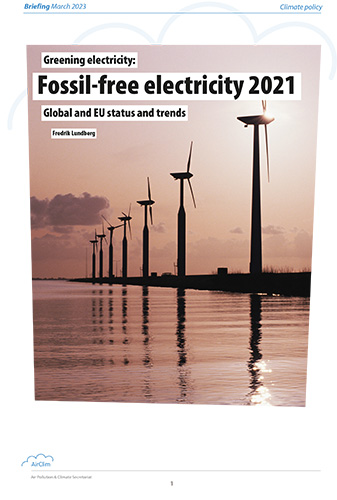
EU energy tax reform stalled
 Unequally taxed. Photo: flickr.com teachernz cc by-nc-sa
Unequally taxed. Photo: flickr.com teachernz cc by-nc-sa
Poland and Romania block even small steps toward technology-neutral fuel taxes in the EU.
The much-needed revision of the EU Energy Tax Directive is in deep trouble. In April 2011 the Commission launched a proposal that is intended to adapt energy taxation in the member states to the EU´s new energy and climate policies (see AN 3/2011), but the proposal has met strong resistance from several member states, Poland being the most pronounced opponent. Since changes in the directive can only be adopted by the Council and with consensus, the prospects for a meaningful revision seem dark.
The EU Energy Directive sets minimum levels for taxes on all energy carriers in the EU member states. The present directive was agreed late in 2003 by the then 15 EU members just before the “Big Bang” in January 2004 when 10 new members joined the Union.
Today the directive is clearly outdated. The minima are low, they don´t reflect the environmental impact of different fuels, the loopholes are numerous and, since present levels were decided 10 years ago, inflation has reduced the real levels.
The Commission proposal was based on “technical neutrality” signifying that fuel taxes should be split into two factors – one related to the energy content, the other to the emissions of fossil CO2 – applied in a similar way to all fuels. The most important consequence of the proposal would have been that all member states would have to tax diesel some 9–10 per cent more per litre than petrol, reflecting the fact that a litre of diesel contains more energy and more carbon than a litre of petrol. Renewable fuels would be exempted from the CO2 factor, but not from the energy factor. The minimum tax on coal would also go up considerably.
Apart from the UK, which applies the same tax rate per litre for diesel and petrol, all EU member states tax diesel less or much less than petrol (see table). Making the technical neutrality mandatory would reverse this situation in all countries, triggering considerably higher diesel taxes.
Three and a half years after the proposal was tabled, the negotiations now deal with an attempt to compromise, much less revolutionise, as developed under the Cypriot (autumn 2012) and Irish (spring 2013) presidencies. The suggestion to make “technical neutrality” mandatory has been rejected, instead only the minima would be based on the two factors of energy content and CO2 emissions. The ambition to apply the same energy content and CO2 emission factors to all fuels has also been abandoned. Instead lower factors are suggested for natural gas, LPG and biofuels than for petrol and diesel.
These drastic dilutions have still not proven sufficient to reach consensus. Poland and lately also Romania are stubbornly and on grounds of principle opposing the very idea of introducing a CO2 factor in the legislation.
Some of the eastern member states also resist short-term increases in the minima, referring to both derogations in their accession agreements that meant the present minima only recently became mandatory for them, but also to the fact that if their numerically low tax rates are related to the GDP per head, the rates are actually higher than in most western member states.
The Lithuanian presidency has announced it does not intend to solve those conflicts, but instead concentrate efforts on less controversial, technical details.
Magnus Nilsson
Transport & Environment
Table: Non-VAT fuel taxes in EU, August 2013, €/1000 l
| Petrol | Super 95 Diesel | |
| EU minimum | 359.00 | 330.00 |
| Cypriot/Irish bid (from 2015) | 360.10 | 340.70 |
| Cypriot/Irish bid (from 2018) | 360.10 | 390.00 |
| Austria | 493.21 | 409.42 |
| Belgium | 613.57 | 427.69 |
| Bulgaria | 363.02 | 329.79 |
| Croatia | 445.45 | 339.39 |
| Cyprus | 439.70 | 410.70 |
| Czech Republic | 496.66 | 423.52 |
| Denmark | 591.25 | 404.45 |
| Estonia | 422.77 | 392.92 |
| Finland | 623.70 | 462.80 |
| France | 612.50 | 439.40 |
| Germany | 654.50 | 470.40 |
| Greece | 683.88 | 343.45 |
| Hungary | 410.03 | 377.62 |
| Ireland | 607.72 | 499.00 |
| Italy | 728.40 | 617.40 |
| Latvia | 433.66 | 350.94 |
| Lithuania | 434.43 | 330.17 |
| Luxembourg | 462.09 | 335.00 |
| Malta | 489.38 | 402.40 |
| Netherlands | 754.55 | 448.28 |
| Poland | 392.48 | 342.55 |
| Portugal | 585.27 | 367.53 |
| Romania | 364.53 | 334.93 |
| Slovakia | 570.17 | 406.05 |
| Slovenia | 559.89 | 443.53 |
| Spain | 464.75 | 370.12 |
| Sweden | 646.24 | 557.28 |
| United Kingdom | 679.45 | 679.45 |
Source: EC Oil Bulletin 19/08/2013

 Download this issue
Download this issue






























